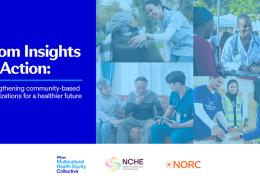This Scientist's Life: Judith Absalon

Meet Judith Absalon, a Senior Director in Vaccines Clinical Research at Pfizer’s Pearl River, N.Y., research site. As a global clinical lead, she’s the head doctor that oversees the clinical trial process when a new vaccine candidate is tested in people.
Clinical trials are rooted in the scientific method, says Absalon. “You start with a question. If you’re lucky, you get to figure out how you’re going to answer the question. Then through diligence, persistence and flexibility, you gather evidence. You’re lucky if you get the answer you hope for, but what’s most important is that you’re abiding by the process. That’s hypothesis generation and clinical trial development and execution. That’s what we do.”

Judith Absalon, a Senior Director in Vaccines Clinical Research, at Pfizer’s Pearl River, N.Y., research site.
She comes from a family of physicians. But Absalon forged her own path by focusing on adult infectious diseases and public health. Early in her career, she did research and teaching in HIV care and prevention, traveling to Africa several times for projects.
As a first-generation immigrant, Absalon says she has always wanted to make an impact in developing countries, like her family’s native Haiti. “While I was born and raised in New York City, everyone in my family is not from this country. I’ve always wanted to go back and do something that would ultimately affect others.” Working in Haiti during medical school, she witnessed the immense need for better access to medical care. “I literally saw people walking six hours from where they lived to receive medical care for a disease that was preventable,” she says.
At Pfizer, for the past seven years, her focus has been on developing vaccines that help prevent the spread of infectious diseases. Her recent work includes developing a maternal vaccine that could help protect infants during the first few months when their immune systems are underdeveloped. “The whole concept of maternal immunization is not new, but it’s only recently gotten more attention as a preventative approach. From a clinical research perspective, it’s intriguing to me. It’s an opportunity to no longer look at pregnant women as a vulnerable population and potentially prevent a devastating disease in infants around the world,” she says.
A decade of diligence. Vaccines must go through extensive testing to ensure that they’re safe and effective. The process can take up to a decade and requires data from tens of thousands of subjects. Absalon stays motivated by focusing on the final goal. “I’m very much of the personality type that as long as I know what the path is and the end game is, I’m fine. The new vaccine I’m working on is interesting because it’s a new area for me. There’s so much to learn. Being engaged early on in a trial or a program is a lot of fun to me.”
She proudly has her “geek” moments when analyzing the data at the end of a study. On a previous vaccine program, she recalls receiving the phase III trial data on a Friday afternoon. “We had a trial with about 6,000 subjects. I got the data packet and I was so excited to see the results. I opened everything up on my computer, and when I looked up again, it was literally six hours later. I had not moved from my desk. That’s what excites me: planning something out from a scientific perspective, not knowing what you’re going to get, and when you get the results, to sort that information out. It was really good data.”
The rigor of science: “Coming from academia, which is often touted as the gold standard, people don’t understand the amount of regulatory stringency that we have to abide by in industry that doesn’t exist in other settings. People need to understand how much effort that goes into making a drug or vaccine, and that the scientists really do care so much about their work and the final product.”





